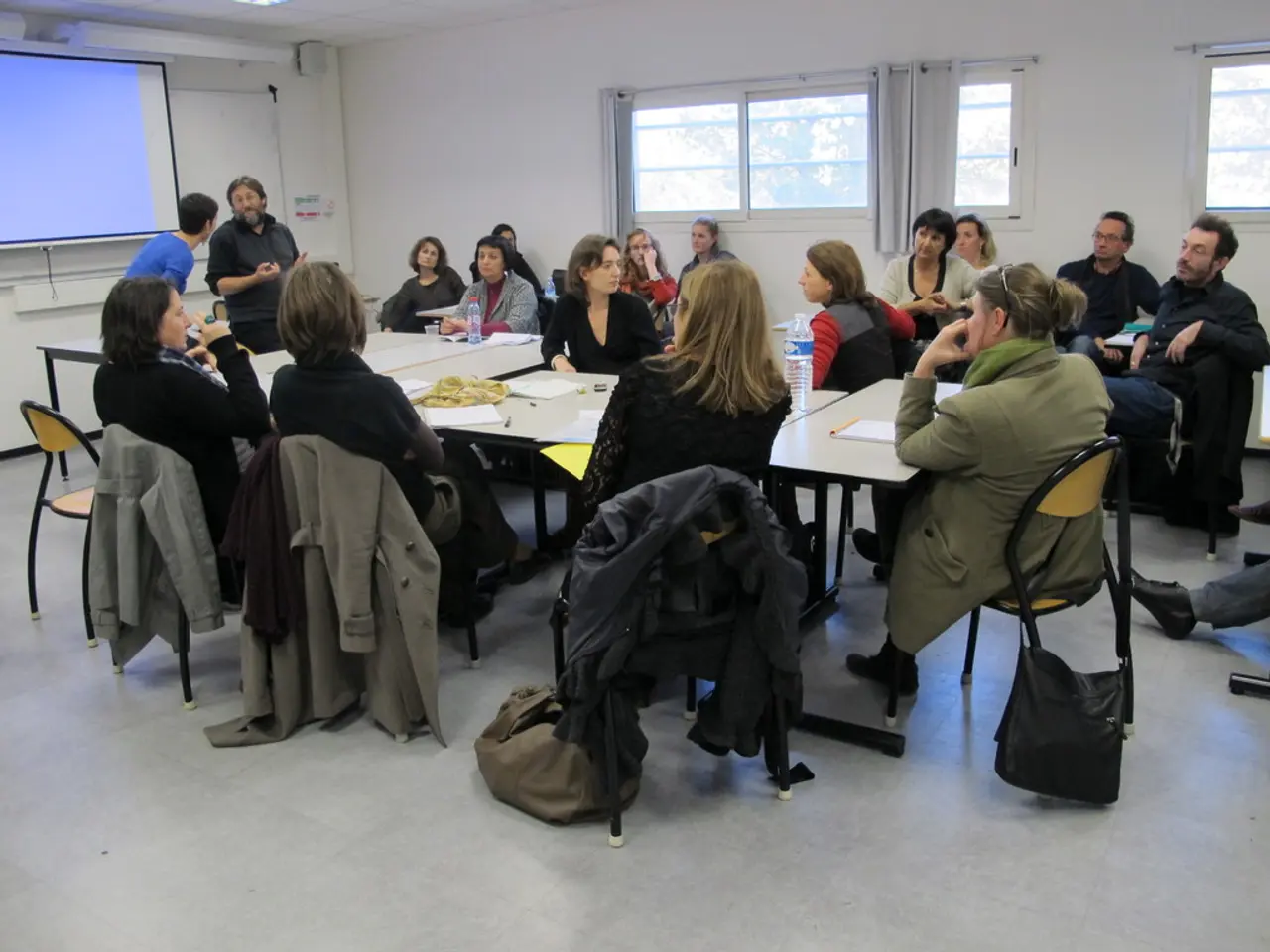War between Israel and Iran Ceasefire Agreed
Europeans intent on persisting with dialogue with Iran
Geneva (dpa) - In a recent development, there's a glimmer of hope for diplomatic resolution as foreign ministers from Germany, France, and the United Kingdom engage in talks with Iran's Abbas Araghtchi, hoping to find a diplomatic solution to the nuclear conflict, following nearly four hours of negotiations. "Today's good outcome is that we leave the room with the impression that the Iranian side is fundamentally ready to continue talking about all important issues," said Germany’s Foreign Minister Johann Wadephul post the meeting in Geneva.
Iran is open to continuing the dialogue. "We support the continuation of talks with the three European countries and the European Union and are ready for another meeting in the near future," said Araghtchi, as reported by the state news agency Irna. However, he expressed a stern warning: "As long as Israel's attacks continue, we will not negotiate with any party."
It remains uncertain whether US President Donald Trump will intervene on Israel's behalf or if Israeli Prime Minister Benjamin Netanyahu will be willing to negotiate with Iran regarding an end to the war.
A week ago, Wadephul, French Foreign Minister Jean-Noël Barrot, and British Foreign Minister David Lammy initiated a conversation to explore opportunities for a diplomatic solution to the nuclear conflict with Araghtchi. While Israel and Iran continued engaging in heavy mutual attacks, European top diplomats in Switzerland attempted to ascertain whether Iran is ready to abandon its nuclear program and relinquish nuclear weapons.
US President Trump had his spokesperson Karoline Leavitt announce the day before that he aims to decide within the next two weeks, considering the upcoming negotiations, whether the USA, as Israel's most important ally, will act in the war.
Wadephul Stresses the Importance of USA for Negotiations
Wadephul described the discussions as highly serious. "The entire region is in an extraordinarily precarious position, and it is our shared goal to avoid further escalation and make progress in negotiations." The Europeans stress the significance of the United States being involved in these negotiations and a solution.
"Iran Poses an Existential Threat to Israel"
The Europeans view Iran's nuclear program with grave concern, said Wadephul. Germany is particularly committed to the security interests of the state of Israel. "Iran poses an existential threat to the state of Israel, and this existential threat to the state of Israel must be eliminated," stressed Wadephul later in the ZDF-"heute journal". "In my view, the fastest and most effective way to achieve this in this dangerous situation is through negotiations."
Lammy: This is a Dangerous Moment
Lammy expressed their aim to continue talks and negotiations with Tehran. "This is a dangerous moment," he said. He added: "It is of the utmost importance that we avoid a regional escalation of this conflict, both because of the implications for us all and for the people domestically worried about the cost of living at this time."
Barrot also said that the Europeans expect Iran to be open to negotiating with the USA as well, in order to achieve a negotiated solution through dialogue in the current crisis situation. The risk for the Middle East region, but also for Europe, as a result of the war between Israel and Iran is substantial.
EU’s Foreign Policy Chief, Kaja Kallas, also participated in the discussions. Initially, the Europeans congregated among themselves at the residence of the German ambassador for disarmament.
As the conflict persists, the air force evacuates several dozen German citizens out of Israel. Two propeller-driven aircraft of the type Airbus A400M with 64 people aboard are currently en route from Tel Aviv to Germany, the Ministry of Defense and the Foreign Office announced in the evening. Due to the war, airspace in both countries is actually closed for air traffic. An initial report of this incident was published by Spiegel.
This is the first time in the current conflict that Germans are being evacuated by the Bundeswehr - previously, there were two charter flights, but they did not depart from Israel, but from Jordan. For the journey there, longer bus or car rides were necessary, which the affected individuals had to arrange themselves.
Meanwhile, before the meeting with the Europeans in the UN Human Rights Council, Iran’s Foreign Minister, Araghtchi, appealed to the international community to condemn Israel's attacks on his country. "Any justification of this unjust and criminal war would amount to complicity," he said. The Iranian accused Israel of war crimes and crimes against humanity in its actions in the Gaza Strip.
Mutual heavy attacks continue, despite the talks in Geneva, with Israel and Iran attacking each other. According to Israel’s emergency service Magen David Adom, at least 23 people were injured, three seriously, in an attack in the Israeli city of Haifa. Iranian media also reported an Israeli attack on the port city of Bushehr, where the country’s only nuclear power plant is situated.
Switzerland and Britain decide to close their embassies in Tehran. Britain announced the temporary withdrawal of its embassy staff due to the unsettled security situation. The Swiss Foreign Ministry cited the decision as being made "in view of the intensity of the military operations in Iran and the extremely unstable situation".
The United Nations Refugee Agency (UNHCR) is preparing for larger refugee groups from Iran. "We are creating crisis plans," UNHCR chief Filippo Grandi told the German Press Agency. There are already rumors of arriving refugees from Iran in Armenia, Azerbaijan, and Turkmenistan, Grandi confirmed.
Since the beginning of the war, 24 people have been killed and over 800 injured in Israel due to Iranian attacks, according to official figures. In Iran, more than 650 people have died and over 2,000 injured, according to a US-based human rights network, HRANA. The activists base themselves on informants and publicly accessible sources. The government does not provide statistics on death tolls and injuries.
Recent developments indicate a potential diplomatic opening between Israel and Iran, heavily influenced by the involvement of the United States and, to some extent, Europe. On June 23, 2025, US President Donald Trump announced that Israel and Iran have agreed to a ceasefire, effective that evening. This was confirmed by a senior Iranian official to Reuters, signaling a significant step toward de-escalation. President Trump emphasized that the US would not retaliate against Iran's latest strike and expressed a desire for peace and a broader deal with Iran[1].
Despite the ceasefire announcement, senior Israeli defense officials had previously indicated plans to intensify air strikes against Iran to achieve their military objectives rapidly. However, Israel agreed to adhere to the ceasefire from noon on June 23, 2025. Israeli leadership, including Prime Minister Benjamin Netanyahu, acknowledged that they were close to achieving their aims regarding Iran's nuclear program weaponization threat[1].
The US stance, as conveyed by President Trump and some unnamed Western officials, appears to focus on avoiding further military retaliation and exploring diplomatic solutions. While Israel had been pursuing a military campaign to degrade Iran’s nuclear capabilities, the sudden ceasefire suggests US influence in encouraging both sides toward negotiation. There is no direct mention of a European role in brokering this ceasefire, but Western media officials were cited as emphasizing the US administration's preference for a diplomatic approach[1].
The news of a potential diplomatic resolution between Israel and Iran is gaining traction, following a ceasefire agreement announced by US President Donald Trump on June 23, 2025. This development comes after the American administration expressed their preference for diplomatic solutions over further military escalation, as reported by unnamed Western officials. The ceasefire announcement is significant, as it signals a potential de-escalation in the ongoing war-and-conflicts between the two nations. Meanwhile, the general-news landscape is dominated by discussions about the nuclear conflict and the role of key political players, such as the United States, in brokering a peaceful solution.




